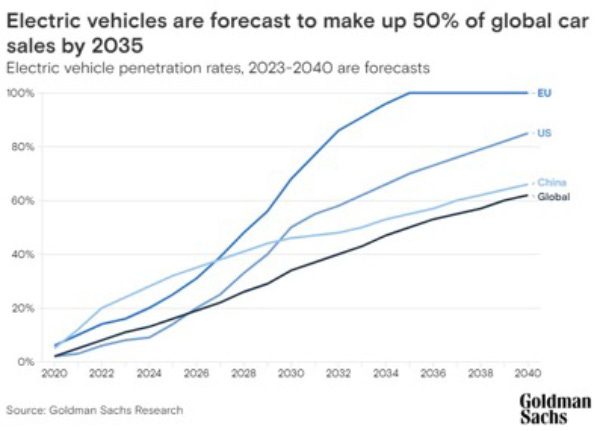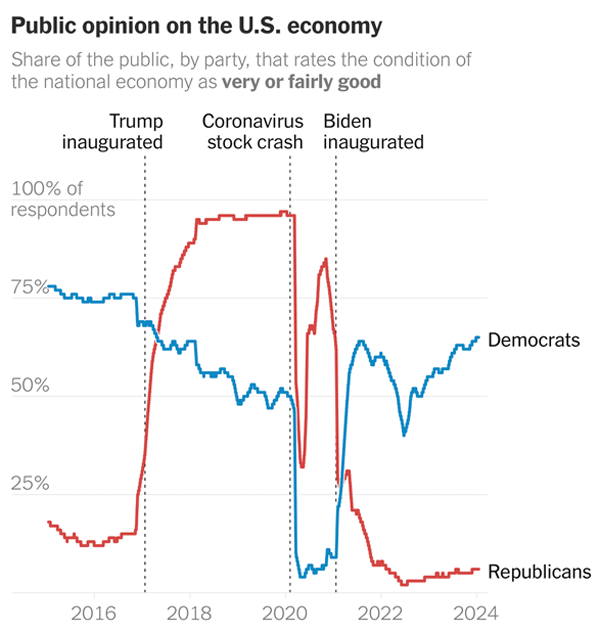AI face quiz, Taylor Swift, deniers, spy pigeons, solar industry future, EV sales, opinions on U.S. economy, Davos 2024, AI and healthcare
February 5, 2024 - The Nett Report
Every other week, the award-winning Nett Report provides readers with thoughtful perspectives helpful to navigating life in a changing world. Past issues can be found here (recent) and here (past three years).
California blasted by atmospheric rivers

Our friends at Monarch Weather provided a sobering prediction of the weather this week in California. Much of this has been on national news, but this summary seemed particularly succinct: “California is in the middle of a potentially historic storm packing enough moisture that has already doubled storm rainfall totals from last week’s flooding event. Numerous flooding incidents will continue across coastal California through Wednesday morning, even after precipitation ends. Rainfall totals for communities between Los Angeles and San Diego may exceed 12”. Once this storm concludes, there is a likely chance of this event being a multi-billion-dollar disaster with destruction to many homes and business fronts. Flash flooding, mudslides, landslides, and debris flows are still possible through Wednesday morning.”
Climate Change
“If you don’t like the road you’re walking, start paving another one.” - Dolly Parton
Climate deniers stick to their thinking to set themselves apart from other political groups
A study by the University of Bonn and the Institute of Labor Economics asked, “do climate change deniers bend the facts to avoid having to modify their environmentally harmful behavior?” The researchers found no evidence to support those ideas according to a February 2, 2024, article in Phys.org. However, the study did find that “some people may, to an extent, define themselves by the very fact that they do not believe in climate change. As far as they are concerned, this way of thinking is an important trait that sets them apart from other political groups, and thus they are likely to simply not care what researchers have to say on the topic.”
Viability of financial products threatens the future of the solar industry
Time magazine, on January 25, 2024, reported that the solar industry could be on the verge of collapse because of questions about the viability of the financial products used to fund the industry’s companies. “In late 2023 alone, more than 100 residential solar dealers and installers in the U.S. declared bankruptcy, according to Roth Capital Partners—six times the number in the previous three years combined. Roth expects at least 100 more to fail. The two largest companies in the industry, SunRun and Sunnova, both posted big losses in their most recent quarterly reports, and their shares are down 86% and 81%, respectively, from their peaks in January 2021,” Time reports. “At the root of these struggles is the complicated financial engineering that helped companies raise money but that some investors and analysts say was built on a framework of lies—or at least exaggerations.”
Electric vehicle sales – mixed perspectives and predictions abound
Transitioning away from internal combustion engine vehicles to electric vehicles has been largely accepted as a pathway to a clean energy future. However, differing perspectives about that future are emerging.
Plug-in hybrids vs. electric cars: We did the math on which is better for you, The Washington Post, January 30, 2024
GM Went All-In on EVs. Dealers Say Buyers Want Hybrids, Wall Street Journal, January 29, 2024
Stellantis CEO warns of EV ‘bloodbath’ and ‘race to the bottom’ if car makers follow Elon Musk’s lead and start cutting prices, Fortune, January 19, 2024
Carmakers are struggling to make electric vehicles affordable for pinched consumers—and rethinking their investments amid sagging demand, Fortune, November 4, 2023
In the midst of this wavering of support, Goldman Sachs is reporting that “Electric vehicles could make up close to half of global car sales by 2035, and our analysts forecast that more advanced autonomous or partially autonomous vehicles could account for a similar share of sales by the same year. It's a fundamental shift, upending labor markets, supply chains, and commodity markets.”
Political Divide
“It used to be the people that were racist wore hoods. Now the hoods are off.” - Michelle Goodwin, Georgetown Law School professor, on MSNBC’s Deadline White House, January 30, 2024
“The shortest distance between truth and a human being is a story.” - Anthony de Mello, spiritual teacher, writer, and public speaker
Political affiliation guides opinions about the U.S. economy
A story in the New York Times The Morning newsletter on January 23, 2024, clearly illustrated the political polarization guiding perceptions of the U.S. economy. Based on data from the polling company Civiqs, the story provided the chart above that shows how perceptions change depending on which party leads the administration.
Lincoln worried about the preservation of the republic in 1838
As a young lawyer, Abraham Lincoln spoke on “The Perpetuation of Our Political Institutions” before the Young Men’s Lyceum on January 27, 1838, according to historian Heather Cox Richardson in her January 27, 2024, newsletter, Letters from an American. “Lincoln saw trouble coming, but not from a foreign power, as other countries feared. The destruction of the United States, he warned, could come only from within … The trouble Lincoln perceived stemmed from the growing lawlessness in the country as men ignored the rule of law and acted on their passions, imposing their will on their neighbors through violence.”
Future of Work / The Economy
“The U.S. federal government is on an unsustainable fiscal path. And that just means that the debt is growing faster than the economy. So, it is unsustainable. I don’t think that’s at all controversial,” – Federal Reserve Chair Jerome Powell in a February 4, 2024, story in The Hill
World Economic Forum: Takeaways from Davos 2024
The World Economic Forum's 54th Annual Meeting in Davos from January 15-19, 2024, brought together world leaders “to rebuild trust, generate new ideas, and create partnerships to advance solutions to the challenges we face. From artificial intelligence to climate change and global growth, we discussed how cooperation can help us make progress.” Four key themes emerged:
Leaders need to pull together on global cooperation and security. Peace and security are possible if we pull together and make wise and bold decisions.
Projections are not destiny, and a new growth model is needed. Multiple factors, including risks, will shape the global economy in 2024.
Humans will have better tools, and AI will bring opportunities and challenges. Human qualities will prevail, and human connections will remain relevant.
Urgency is our only savior in tackling climate change and building new energy systems. It can't be business as usual. We have the technology, but we're not deploying it fast enough.
Chip industry environmental impacts are significant
According to a January 29, 2024, story in Fortune, fabrication plants producing computer chips to power the economy have an environmental downside. The focus has been on job creation; however, the plants creating those jobs “can use as much as 100 megawatt-hours of power hourly, more than what oil refineries or automotive plants consume, according to energy management provider Schneider Electric. Each semiconductor factory can also consume more than 1 million gallons of water daily, in addition to producing thousands of tons of chemical waste annually.”
Health
“If you don’t have hope, you give up, you become apathetic, and you do nothing.” - Jane Goodall
AI has potential as a new way to address healthcare challenges
A January 2024 report from the World Economic Forum in collaboration with ZS, a global management and consulting firm, explores the opportunities for artificial intelligence to address healthcare challenges. The white paper titled Patient-First Health with Generative AI: Reshaping the Care Experience, concludes that “Generative AI, especially when paired with predictive AI techniques, offers the greatest current hope of translating today’s golden age of scientific innovation into equitable improvements to global health and healthcare.”
The Nett Light-Side
Test Yourself: Which Faces Were Made by A.I.?
The New York Times posted a quiz on January 19, 2024, to test your ability to differentiate AI generated images from real ones. I didn’t do well and am curious to learn how you do!
Biggest economic benefit: Super Bowl or Taylor Swift?
Okay, Swifties, check this out. A Fortune story on January 31, 2024, based on a Bank of America study, found that “Super Bowl Sunday is an economic powerhouse that regularly generates over $1 billion in spending activity for the host city. But the new BofA report shows that Taylor Swift’s economic impact isn’t far behind.
Great Backyard Bird Count set for February 16-19, 2024
If you are a bird lover, here’s your chance to join a global movement and help scientists assess bird populations. The Great Backyard Bird Count (GBBC) takes place February 16–19, 2024. Visit your favorite birdwatching places and spend 15+ minutes enjoying birds - then report what you found. Prep for GBBC with a webinar full of tips and an interactive map of events and activities around the globe (also in Spanish and French.)
Indian police release pigeon spy after 8 months
Better count this bird again. Eight months ago, a pigeon was captured near a port in Mumbai, India, with “two rings tied to its legs carrying words that looked like Chinese.” According to an NBC7 report on February 1, 2024, the bird was suspected to be involved in espionage and was sent to a pet hospital. “Eventually, it turned out the pigeon was an open-water racing bird from Taiwan that had escaped and made its way to India.” The pigeon was released on January 30. Two other pigeons thought to be spies were captured in recent years. One was not a spy (2020), and the other carried a note that threatened Indian Narendra Prime Minister Modi (2016).
About Carl Nettleton
Carl Nettleton is an award-winning writer, speaker, thought partner, facilitator, and subject-matter expert regarding water, climate, sustainability, the ocean, and binational U.S.-Mexico border affairs. Nettleton Strategies, the consultancy he founded in 2007, is a trusted source of analysis and advice on issues at the forefront of public policy, business, and the environment. He helps people and organizations to think strategically about their options for change. He is also the founder of OpenOceans Global, a nonprofit addressing ocean plastic in a new way.
Nettleton Strategies
www.nettstrategies.com








